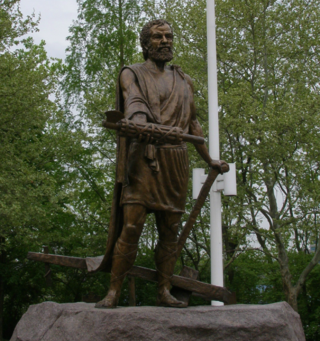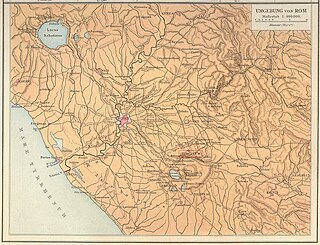Related Research Articles

Lucius Quinctius Cincinnatus was a Roman patrician,statesman,and military leader of the early Roman Republic who became a legendary figure of Roman virtue—particularly civic virtue—by the time of the late Republic.

The Battle of Mount Algidus was fought in 458 BC,between the Roman Republic and the Aequi,near Mount Algidus in Latium. The Roman dictator Lucius Quinctius Cincinnatus turned an expected Roman defeat into an important victory.

Lucius Minucius Esquilinus Augurinus was a Roman politician in the 5th century BC,consul in 458 BC,and decemvir in 450 BC.

The gens Marcia,occasionally written Martia,was one of the oldest and noblest houses at ancient Rome. They claimed descent from the second and fourth Roman Kings,and the first of the Marcii appearing in the history of the Republic would seem to have been patrician;but all of the families of the Marcii known in the later Republic were plebeian. The first to obtain the consulship was Gaius Marcius Rutilus in 357 BC,only a few years after the passage of the lex Licinia Sextia opened this office to the plebeians.

The gens Sempronia was one of the most ancient and noble houses of ancient Rome. Although the oldest branch of this gens was patrician,with Aulus Sempronius Atratinus obtaining the consulship in 497 BC,the thirteenth year of the Republic,but from the time of the Samnite Wars onward,most if not all of the Sempronii appearing in history were plebeians. Although the Sempronii were illustrious under the Republic,few of them attained any importance or notice in imperial times.

The gens Minucia was an ancient Roman family,which flourished from the earliest days of the Republic until imperial times. The gens was apparently of patrician origin,but was better known by its plebeian branches. The first of the Minucii to hold the consulship was Marcus Minucius Augurinus,elected consul in 497 BC.
Lucius Sergius Fidenas was a Roman politician during the 5th century BC,and was elected consul in 437 and 429 BC. In 433,424,and 418 BC he was military tribune with consular power.
The gens Nautia was an old patrician family at ancient Rome. The first of the gens to obtain the consulship was Spurius Nautius Rutilus in 488 BC,and from then until the Samnite Wars the Nautii regularly filled the highest offices of the Roman Republic. After that time,the Nautii all but disappear from the record,appearing only in a handful of inscriptions,mostly from Rome and Latium. A few Nautii occur in imperial times,including a number who appear to have been freedmen,and in the provinces.
Lucius Papirius Crassus was a consul of the Roman republic in 436 BC and possibly a censor in 430 BC.
Aulus Sempronius Atratinus was a consular tribune of the Roman Republic in 425,420,416 BC and possibly consul in 428 BC.
Spurius Nautius Rutilus was a consular tribune of the Roman Republic in 424 BC.
Quintus Fabius Vibulanus was a consul of the Roman Republic in 423 BC and a consular tribune in 416 and 414 BC.
Titus Quinctius Capitolinus Barbatus was a consul of the Roman Republic in 421 BC.
Spurius Nautius Rutilus was a consul of the Roman Republic in 411 and a consular tribune in 419,416 and 404 BC.
Publius Lucretius Tricipitinus was a consular tribune of the Roman Republic in 419 and 417 BC.
Marcus Papirius Mugillanus was a consular tribune in 418 and 416 BC,and perhaps consul of the Roman Republic in 411.
Gaius Valerius Potitus Volusus was a consul in 410 and consular tribune in 415,407 and 404 BC of the Roman Republic.
Gnaeus Cornelius Cossus was a consular tribune in 414 BC and consul in 409 BC of the Roman Republic.
Lucius Valerius Potitus was a five time consular tribune,in 414,406,403,401 and 398 BC,and two times consul,in 393 and 392 BC,of the Roman Republic.
Manius Sergius Fidenas was a consular tribune of the Roman Republic in 404 and 402 BC.
References
- ↑ Robert Maxwell Ogilvie, Commentary on Livy, books 1–5, Oxford, Clarendon Press, 1965, pp. 404, 405.
- Gaius Nautius Rutilus in Smith's Dictionary of Greek and Roman Biography and Mythology
- Livy, Ab Urbe Condita, 2.53